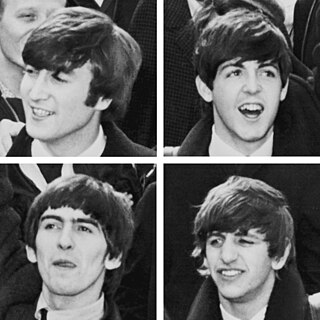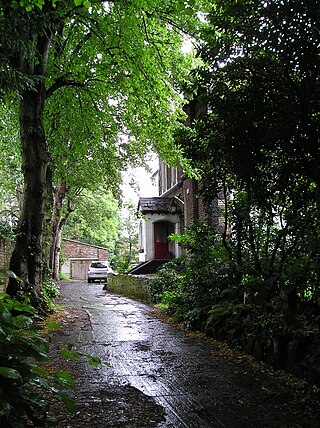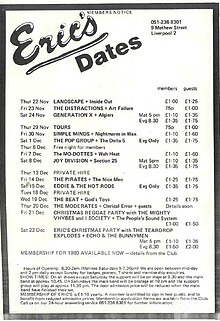
Mersey Beat was a music publication in Liverpool, England in the early 1960s. It was founded by Bill Harry, who was one of John Lennon's classmates at Liverpool Art College. The paper carried news about all the local Liverpool bands, and stars who came to town to perform.

The Cavern Mecca was a Beatles museum in Liverpool. Founded in 1981 and named for the Cavern Club, it was instrumental in the birth of Beatles fan-based tourism in Liverpool. It was located on the corner of Rainford Square and Mathew Street.

Allan Richard Williams was a British businessman and promoter who was the original booking agent and first manager of the Beatles. He drove the van to take the young band to Hamburg, West Germany, in 1960, where they gained the vital show business experience that led to their emergence on the world stage. Williams was also a promoter and agent of a number of other Liverpool rock acts, helping stoke the Merseybeat boom of the early 1960s.

Peter James Wylie is an English singer-songwriter and guitarist, best known as the leader of the band variously known as Wah!, Wah! Heat, Shambeko! Say Wah!, JF Wah!, The Mighty Wah! and Wah! The Mongrel.
William Harry is the creator of Mersey Beat, a newspaper of the early 1960s which focused on the Liverpool music scene. Harry had previously started various magazines and newspapers, such as Biped and Premier, while at Liverpool's Junior School of Art. He later attended the Liverpool College of Art, where his fellow students included John Lennon and Stuart Sutcliffe, who both later performed with the Beatles. He published a magazine, Jazz, in 1958, and worked as an assistant editor on the University of Liverpool's charity magazine, Pantosphinx.

Liverpool has a lengthy tradition of music both classical and pop. It is well known for the Beatles. Its pop and rock music scene has also been important in the development of a number of other bands and artists since the 1950s.

Deaf School is an English art rock/new wave band, formed in Liverpool, England, in January 1974.

The Roadrunners were an English band that emerged from the burgeoning music scene in 1960s Liverpool.

Mathew Street is a street in Liverpool, England, notable as the location of the new Cavern Club, the Beatles having played in the original club on numerous occasions in their early career.
Jim Bennett is a British poet. He performed alongside Roger McGough and Adrian Henri in the late 1960s.

The Casbah Coffee Club, officially Casbah Club, was a rock and roll music venue in the West Derby area of Liverpool, England, that operated from 1959 to 1962. Started by Mona Best, mother of early Beatles drummer Pete Best, in the cellar of the family home, the Casbah was planned as a members-only club for her sons Pete and Rory and their friends, to meet and listen to the popular music of the day. Mona came up with the idea of the club after watching a TV report about the 2i's Coffee Bar in London's Soho where several singers had been discovered.
The Armadillo Tea Rooms was a café in Liverpool that were a significant part of the early '80s music scene. This was helped by their proximity to Mathew Street and Probe Records.

Stanley Street, in the centre of Liverpool, England, runs south between Dale Street and Whitechapel. As well as being home to numerous businesses ranging from estate agents, solicitors, bars and restaurants, there are also apartments in upper floors of some of the buildings. As part of the Big Dig, the southern half of the street between Whitechapel and Victoria Street was repaved in 2007, and is used as a taxi-rank serving Liverpool's central shopping district and Mathew Street.

The Syndicate was a superclub and music venue in Blackpool, Lancashire, England. It was the largest nightclub in North West England, and claimed to be the largest nightclub in the United Kingdom. The club opened in December 2002 and had at the time of closing, three levels of floor space, three segmented rooms, and a VIP floor. It had a capacity of 5,000 if including the club 'status', which was part of the building but was advertised as a second nightclub in the earlier years. Otherwise, the capacity was 4,500, with a 2,200 capacity in the downstairs section, and a 2,300 capacity in the higher levels. The higher floors were tiered, with the VIP section being at the top of the tier overlooking a balcony section below which itself overlooked the dancefloor. The dance floor area had a revolving dance floor in the middle of it. This whole upper section of floors was a single open space and was named the 'Dance Arena'.
The Cavern Club at 10 Mathew Street, in Liverpool was the venue where the Beatles' UK popularity started. John Lennon, Paul McCartney, George Harrison and Pete Best were first seen by Brian Epstein at the club. Epstein eventually became their manager, going on to secure them a record contract. Best was replaced by Ringo Starr on 16 August 1962, which upset many Beatles fans. After taunts of, "Pete forever, Ringo never!", one agitated fan headbutted Harrison in the club.

The Cavern Club is a music venue on Mathew Street, Liverpool, England.

In His Life: The John Lennon Story is a 2000 American made-for-television biographical film about John Lennon's teenage years, written by the film's executive producer, Michael O'Hara, and directed by David Carson.
Ken Testi is British entrepreneur most notable for his involvement with the bands Queen and Deaf School and with the Liverpool music venue Eric's Club.
Anthony Booth was a British commercial artist best known as the original poster artist for the Beatles and other bands in the Merseybeat era. He was known around Liverpool in the early 1960s as Brian Epstein's "right-hand man".
















